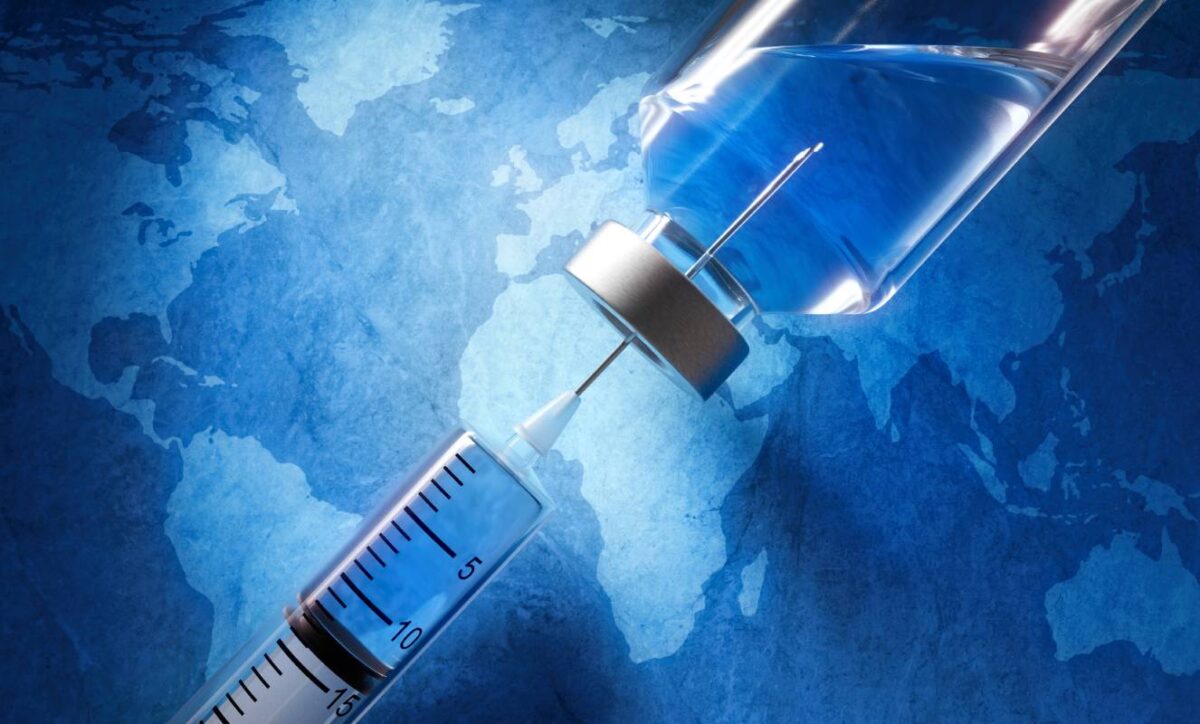COVID-19 Vaccine Sharing

In the final month of 2021, low- and middle-income countries around the world received 309 million vaccine doses through COVAX, a COVID-19 vaccine sharing initiative first organized in April 2020. While this achievement was a significant breakthrough for COVAX, the total number of doses delivered in 2021 — roughly 910 million — falls far short of the year-end goal of 2 billion doses.1
Public health experts foresaw the threat of “vaccine nationalism” — the pattern by which major vaccine-producing countries like the United States vaccinate their own populations before collaborating with countries lacking the resources to manufacture their own vaccine supplies.2
Vaccination has remained highly variable worldwide. At the end of 2021, approximately 75% of individuals in high- and upper-middle-income countries had received at least one dose of a vaccine; this number stood at just 8.5% in low-income countries.3 According to the World Health Organization (WHO), out of 8 billion doses distributed globally in mid-December 2021, just 3% were administered in Africa.4
Within Africa, vaccination rates have varied greatly according to state-by-state conditions: Botswana, Morocco, and Tunisia, for example, were three of the six African countries that reached the WHO goal of 40% vaccination by the end of 2021. Meanwhile, many countries have vaccinated less than 1% of their populations; in the Democratic Republic of the Congo, for example, one of the most populous countries in Africa, only 0.32 doses were distributed per 100 people as of December 28.5
The failure to meet vaccine targets is attributable to numerous factors. According to the CEO of Gavi, a public-private partnership that directs COVAX alongside the WHO and the Coalition for Epidemic Preparedness Innovations, vaccine manufacturers’ poor communication and de-prioritization of COVAX shipments was a primary setback for COVAX. On the flipside, a report by STAT and the Bureau of Investigative Journalism found that throughout 2021, countries have struggled to communicate with COVAX regarding when vaccine shipments might be received, challenging their ability to prepare for their deployment. As of September 24, just 18% of 785 million doses promised to COVAX had been delivered.6
COVAX’s initial plans for vaccine deliveries relied heavily on contracts with the Serum Institute of India, with nearly 75% of its initial doses planned to come from the company. When India faced a devastating wave of infections early in 2021, the country imposed a de facto ban on vaccine exports, resulting in delays to shipments of up to 90 million doses in March and April. India resumed exports in November.1 According to public health officials, delays in shipments, beyond slowing global vaccination rates, have helped foment the spread of misinformation about the safety of COVID-19 vaccines within receiving countries.6,7
According to STAT’s report, equitable global distribution has also been hindered as wealthier countries with systems in place to distribute available vaccines have taken advantage of their participation in the COVID-19 vaccine sharing program. In June, the UK received 530,000 doses from COVAX, while the entire continent of Africa received only four times that number in the same period.6
The uncertainty surrounding when vaccine shipments might be received introduced additional challenges to governments already struggling to solve the challenges of maintaining cold chains while deploying vaccines to rural areas with limited health care infrastructure. Nearly half of the 418 million doses of COVID-19 vaccines that have arrived in African countries are still waiting to be used. Moreover, the threat of supply-chain shortages has exacerbated delays; for example, COVAX has entered agreements with syringe manufacturers that limit vaccine deliveries in order not to outpace syringe availabilities.7
Moving into 2022, the African Vaccine Acquisition Trust, the Africa Centres for Disease Control and Prevention and COVAX have jointly stressed the need for a more reliable supply of vaccines to African countries, specifically without “earmarking” vaccines, which can cause short shelf-life donations to go to waste. Furthermore, they emphasize the importance of delivering quality vaccines with necessary ancillary equipment (such as syringes and diluent) to further streamline vaccination. It is unclear whether COVAX will continue to maintain the level of vaccine deployment attained in December 2021, but collaboration between these organizations may improve COVID-19 vaccine sharing and vaccine equity overall.8
References
- Taylor A. Covax vaccine deliveries surge in final stretch of 2021, with a record 300 million doses sent out in December. Washington Post. https://www.washingtonpost.com/world/2022/01/01/covid-covax-doses-delivered/. Published January 1, 2022.
- Katz IT, Weintraub R, Bekker L-G, Brandt AM. From vaccine nationalism to vaccine equity – finding a path forward. N Engl J Med. 2021;384(14):1281-1283. doi:10.1056/NEJMp2103614
- Share of people who received at least one dose of COVID-19 vaccine. Our World in Data. https://ourworldindata.org/grapher/share-people-vaccinated-covid?country=High+income~Upper+middle+income~Lower+middle+income~Low+income
- Key lessons from Africa’s COVID-19 vaccine rollout. WHO | Regional Office for Africa. https://www.afro.who.int/news/key-lessons-africas-covid-19-vaccine-rollout
- Ritchie H, Mathieu E, Rodés-Guirao L, et al. Coronavirus Pandemic (COVID-19). Our World in Data. Published online 2020. https://ourworldindata.org/covid-vaccination-global-projections
- Goldhill O, Rosa Furneaux and Madlen Davies — TBIJ, Boodman E, Garde D, Sheridan K, Feuerstein A. ‘Naively ambitious’: How COVAX failed on its promise to vaccinate the world. STAT. Published October 8, 2021. https://www.statnews.com/2021/10/08/how-covax-failed-on-its-promise-to-vaccinate-the-world/
- Adepoju P. As COVID-19 vaccines arrive in Africa, Omicron is reducing supply and increasing demand. Nat Med. Published online 2021. doi:10.1038/d41591-021-00073-x
- Joint statement on dose donations of COVID-19 vaccines to African countries. World Health Organization. https://www.who.int/news/item/29-11-2021-joint-statement-on-dose-donations-of-covid-19-vaccines-to-african-countries
